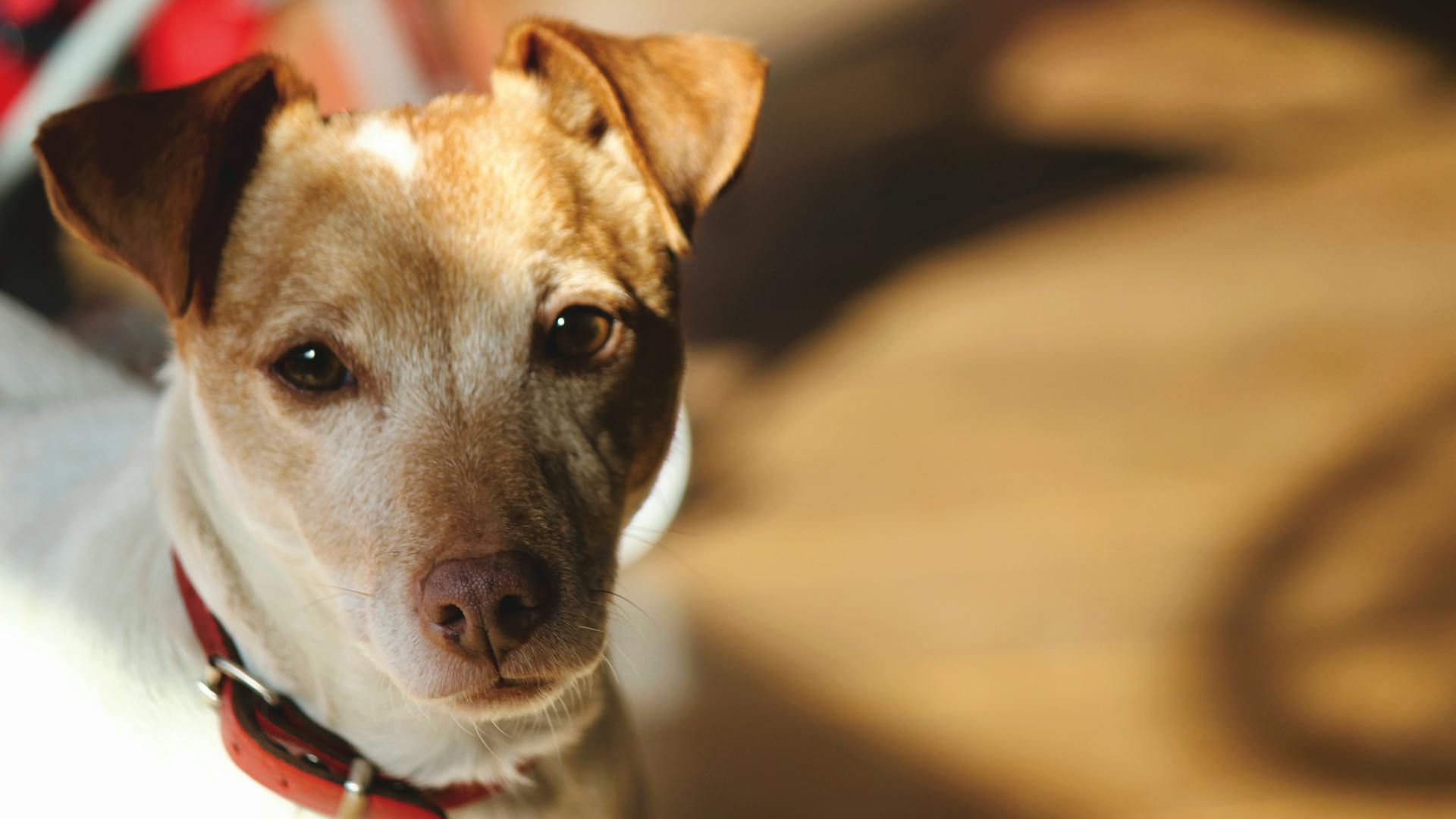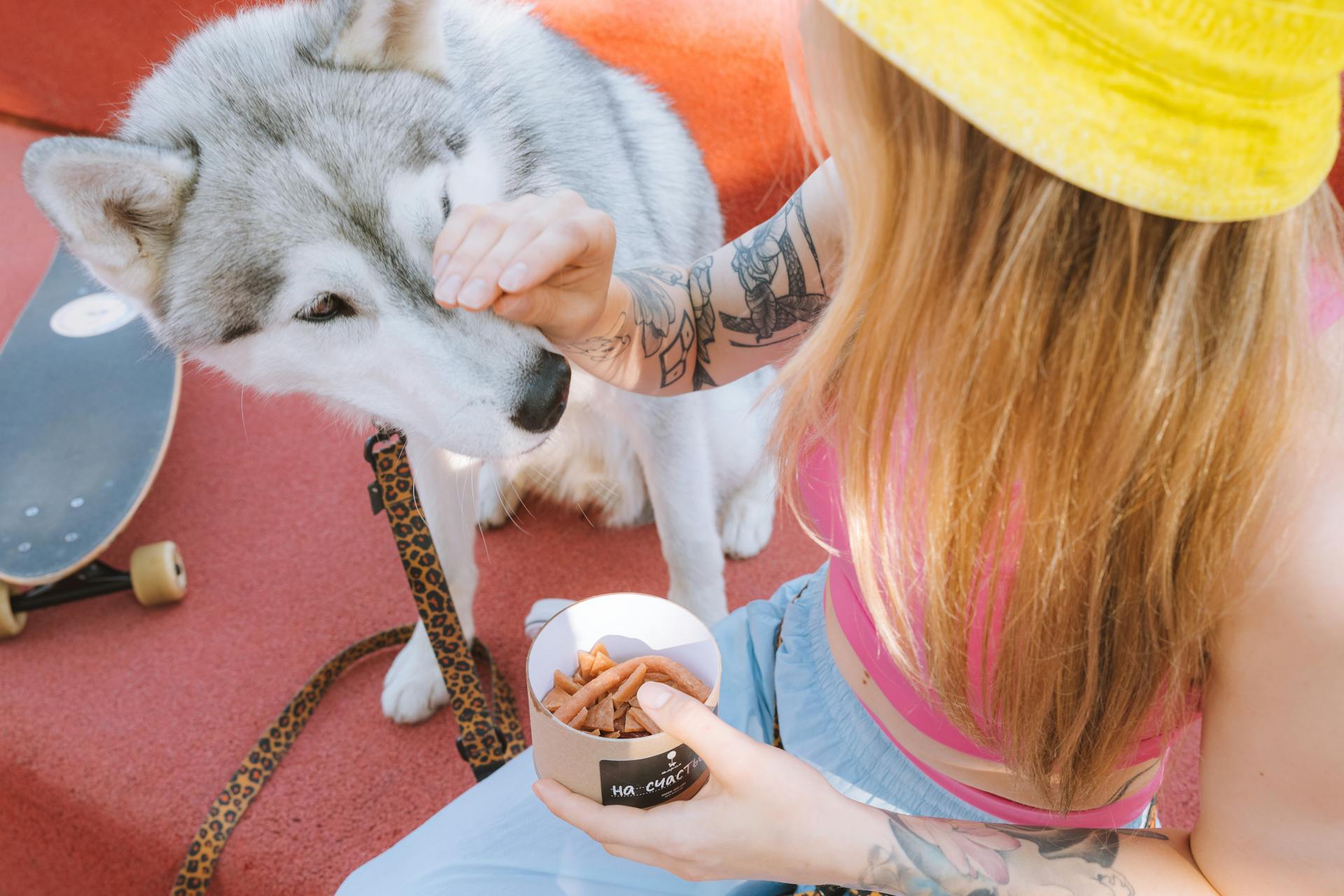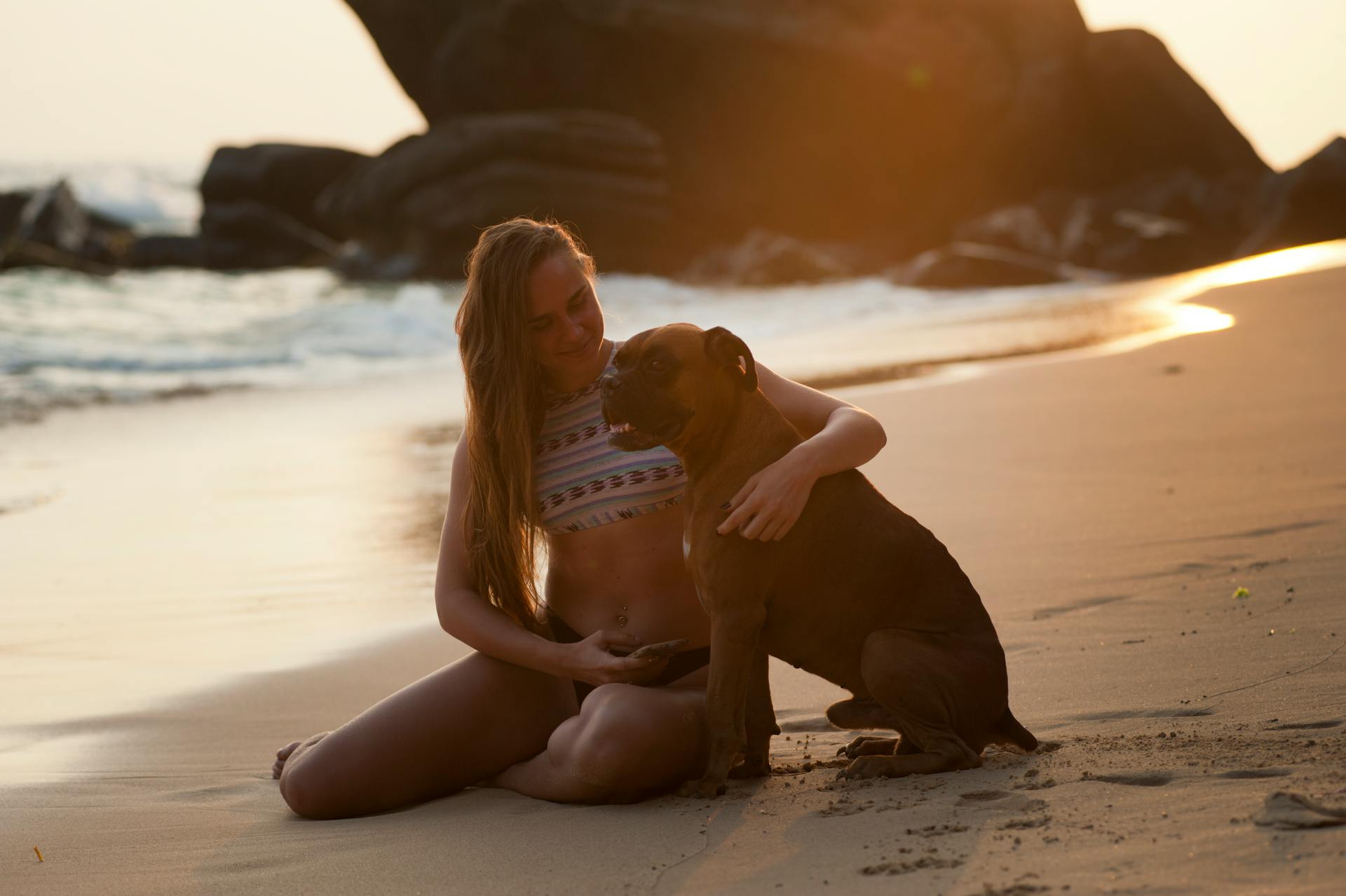
The Potcake puppy is a unique and lovable breed, hailing from the Bahamas and Turks and Caicos Islands. They are a mix of various breeds, including the Basset Hound, Beagle, and Foxhound.
Potcake puppies are known for their friendly and outgoing personalities, making them excellent family pets. They are often described as being "velcro dogs" because of their tendency to stick close to their owners.
One of the most distinctive features of the Potcake breed is their short, smooth coats, which come in a variety of colors including brown, black, and tan. This low-maintenance coat makes them a great choice for busy families.
In terms of health, Potcake puppies are generally a hearty breed, but they can be prone to certain health issues, including hip dysplasia and eye problems. Regular veterinary check-ups and a healthy diet can help prevent or manage these issues.
Worth a look: What Are Potcake Dogs
Physical Characteristics
Potcakes are a unique breed with a wide range of appearances. They can resemble a typical pariah dog or have characteristics of mastiffs, hounds, spaniels, terriers, or retrievers.
Their coats vary in color, with many being brown, white, black, and a mix of these colors. You'll often see a potcake with a smooth coat, but some may have a "shaggy" or rough coat.
A typical potcake will stand approximately 24 inches at the withers, which is the height of their shoulder blades. This is consistent across most potcakes.
Their weight can vary, but healthy dogs typically weigh between 45 to 50 pounds, while strays may weigh only 25 pounds.
Some common colorations of potcakes include black, brown, tan, and white. Their ears are often floppy, and they have a lengthy snout and expressive almond-shaped eyes that showcase their intelligence and curiosity.
Here are some key physical characteristics of potcakes:
- Height: approximately 24 inches at the withers
- Weight: 45-50 pounds (healthy dogs), 25 pounds (strays)
- Coat: smooth, shaggy, or rough
- Color: brown, white, black, tan, and mixed colors
- Ears: floppy
- Snout: lengthy
- Eye shape: almond-shaped
Behavior and Temperament
Potcake puppies are incredibly intelligent and loyal, making them a joy to be around. They're also calm and resilient, able to eat a wide variety of foods that would upset most dogs.
Their stomachs are incredibly hardy, but they do tend to wander if not properly confined or supervised. This means they need regular exercise and mental stimulation to prevent boredom-related behaviors.
Potcakes are known to form strong bonds with their human families, becoming deeply attached and protective of their loved ones. They're eager to please and respond well to positive reinforcement training methods.
Temperament & Intelligence of the Bahamian
The Bahamian Potcake is a unique breed, to say the least. They've developed "street smarts" from surviving on the streets instead of selective breeding, which makes them incredibly resourceful.
These dogs are known for their loyalty and will to survive, often forming strong bonds with their human families. They're also used to interacting with tourists and the homeless on the islands, making them generally not skittish or aggressive.
Potcakes are adaptable by nature, thriving in various environments and making excellent family pets. They're typically friendly with children and other animals, and their territorial instincts render them effective watchdogs.

With proper socialization and training, Potcakes can become well-rounded and well-behaved dogs. However, they do require regular mental and physical stimulation to prevent boredom-related behaviors.
In general, Bahamian Potcakes are eager to please and respond well to positive reinforcement training methods. This makes them a joy to train and interact with, especially for first-time dog owners.
If this caught your attention, see: Medical Dog Training
Three Little-Known Facts About the Bahamian
Potcakes are unique dogs with some specific requirements, and one of them is their adaptability to hot climates. They can thrive in temperatures up to 100 degrees Fahrenheit.
Bahamian Potcakes are highly social dogs that require a lot of attention and interaction with their owners. They are known to be loyal and affectionate companions.
Potcakes are natural swimmers and love the water, making them a great breed for families who live near a beach or have a pool.
Are They Dangerous?
Traditional Potcake dogs tend to not be aggressive, even when feral and in packs.
However, their behavior can be influenced by other breeds that may be present in their environment, such as larger guard-style dogs like rottweilers and pit bulls.
In the Turks and Caicos, nearly all dog attacks on people have been committed by pets owned by irresponsible owners.
Local laws meant to curb dangerous pet behavior are unfortunately rarely enforced by the government.
Feral Potcakes may have a more aggressive temperament due to the influence of these larger breeds.
Care and Maintenance
Potcakes are relatively low-maintenance dogs when it comes to grooming.
Their smooth coats without an undercoat make them easy to groom, requiring only occasional brushing and baths.
Exercise
Exercise is essential for Potcakes. They're moderately active dogs that thrive on playtime and regular walks.
Younger Potcakes require more activity than older ones to burn off excess energy and avoid boredom. This is especially important for households with younger dogs.
Potcakes will take on the tone of their home, so if their owners are couch potatoes, they'll likely be too. On the other hand, they're ready for a brisk walk or playtime at a moment's notice.
Exceptionally athletic Potcakes may even excel in canine competitions.
Grooming
Grooming is a breeze for Potcake owners, as these dogs have smooth coats without an undercoat, making them easy to maintain.
Their coats only require occasional brushing, and they can get by with infrequent baths.
If your Potcake has a thicker coat, you'll need to brush them more often to prevent matting and tangling.
Regular nail trimming is a must to keep your Potcake's nails in check, and their ears need to be cleaned frequently to prevent infections.
Broaden your view: Bahamian Potcake
Owning a Potcake Puppy
Potcakes are unique dogs with some specific requirements. They need regular grooming to prevent matting and tangling of their coat.
They thrive on a balanced diet that includes high-quality dog food, and a consistent feeding schedule is essential to maintain their weight.
Potcakes are energetic dogs that require regular exercise to stay happy and healthy. A daily walk and playtime should be a priority.
Their intelligence and trainability make them a joy to work with, and early socialization is key to developing good behavior.
Frequently Asked Questions
What makes a dog a Potcake?
A Potcake is a mixed-breed dog originating from the Caribbean, specifically The Bahamas or Turks & Caicos Islands. The name "Potcake" comes from the leftover rice or macaroni mixture often stuck to the bottom of a family cooking pot, a term of endearment that reflects the dog's humble island roots.
Are Potcakes cuddly?
Yes, Potcakes are known for their affectionate and cuddly nature, making them a great companion for those who love snuggles. Their loving personality is just one of the many unique characteristics that set them apart from other breeds.
Featured Images: pexels.com


